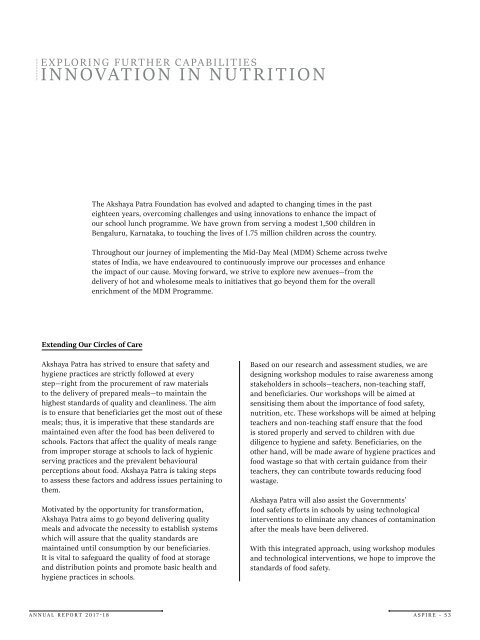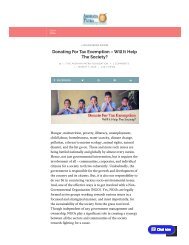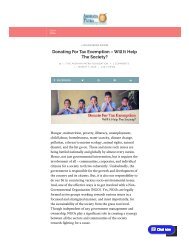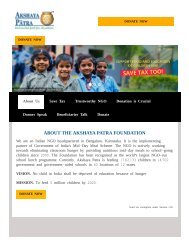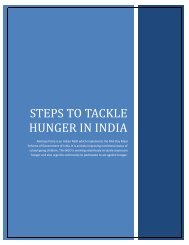Aspire-annual-report2017-18-forwebsite
Create successful ePaper yourself
Turn your PDF publications into a flip-book with our unique Google optimized e-Paper software.
EXPLORING FURTHER CAPABILITIES<br />
INNOVATION IN NUTRITION<br />
The Akshaya Patra Foundation has evolved and adapted to changing times in the past<br />
eighteen years, overcoming challenges and using innovations to enhance the impact of<br />
our school lunch programme. We have grown from serving a modest 1,500 children in<br />
Bengaluru, Karnataka, to touching the lives of 1.75 million children across the country.<br />
Throughout our journey of implementing the Mid-Day Meal (MDM) Scheme across twelve<br />
states of India, we have endeavoured to continuously improve our processes and enhance<br />
the impact of our cause. Moving forward, we strive to explore new avenues—from the<br />
delivery of hot and wholesome meals to initiatives that go beyond them for the overall<br />
enrichment of the MDM Programme.<br />
Smart Food for Education: Introduction of Millets<br />
The Mid-Day Meal (MDM) Programme has been<br />
traditionally dominated by rice and wheat, and while<br />
these grains have undeniably been a blessing for<br />
millions of children across the country, the time has<br />
come to look beyond them to enhance the nutrition<br />
profile of mid-day meals. Millets, the high fibre,<br />
protein-rich smart foods, can help achieve this objective.<br />
Akshaya Patra has recently initiated the ‘Integration<br />
of Millets in Mid-Day Meals’ in partnership with<br />
the Government of Karnataka, as a pilot initiative.<br />
Currently, the initiative covers 1,622 beneficiaries across<br />
ten schools in Bengaluru, Karnataka. In Hyderabad, with<br />
the support of the Government of Telangana, ready-toconsume<br />
millet-based items have been introduced in all<br />
our beneficiary schools, serving 1.5 lakh children.<br />
The purpose of integrating millets as part of the MDM<br />
Programme is to contribute to the enhancement of<br />
nutritional status and health of the beneficiaries by<br />
providing them diversified and nutrient-rich meals. This<br />
will be done by creating recipes that cater to cultural<br />
and local palates of the regions where we serve.<br />
Scientific research is a testimony to the superiority<br />
of millets over rice and wheat, in terms of nutritional<br />
value. They are rich in proteins, minerals, dietary fibres,<br />
iron, zinc, calcium, phosphorus, potassium, vitamin B,<br />
and essential amino acids. They are high in antioxidants,<br />
thus perfect for heart health; gluten-free, thus perfect<br />
replacement for wheat-based foods for people with<br />
gluten intolerance; and their low Glycaemic Index (GI)<br />
makes them apt for consumption by diabetics. The<br />
nutritional content of millets, along with their health<br />
benefits, makes them deserving constituents of the<br />
regular diet of children as well as adults.<br />
Integration of millets will also benefit farmers through<br />
the benefit in sales, the commitment of purchase,<br />
ecological benefits, and lower production costs. Millets,<br />
the ‘Smart Crop of the 21st Century’, are not only<br />
indigenous crops, they also consume less water than<br />
sugarcane, rice, and wheat, and require less use of<br />
chemical fertilizers. It makes them eco-friendly and<br />
sustainable crops for farming. They are also droughttolerant,<br />
pest-resistant, high-yielding, low-risk crops<br />
that require a low input cost, thus making them<br />
extremely beneficial to farmers.<br />
Extending Our Circles of Care<br />
Akshaya Patra has strived to ensure that safety and<br />
hygiene practices are strictly followed at every<br />
step—right from the procurement of raw materials<br />
to the delivery of prepared meals—to maintain the<br />
highest standards of quality and cleanliness. The aim<br />
is to ensure that beneficiaries get the most out of these<br />
meals; thus, it is imperative that these standards are<br />
maintained even after the food has been delivered to<br />
schools. Factors that affect the quality of meals range<br />
from improper storage at schools to lack of hygienic<br />
serving practices and the prevalent behavioural<br />
perceptions about food. Akshaya Patra is taking steps<br />
to assess these factors and address issues pertaining to<br />
them.<br />
Motivated by the opportunity for transformation,<br />
Akshaya Patra aims to go beyond delivering quality<br />
meals and advocate the necessity to establish systems<br />
which will assure that the quality standards are<br />
maintained until consumption by our beneficiaries.<br />
It is vital to safeguard the quality of food at storage<br />
and distribution points and promote basic health and<br />
hygiene practices in schools.<br />
Based on our research and assessment studies, we are<br />
designing workshop modules to raise awareness among<br />
stakeholders in schools—teachers, non-teaching staff,<br />
and beneficiaries. Our workshops will be aimed at<br />
sensitising them about the importance of food safety,<br />
nutrition, etc. These workshops will be aimed at helping<br />
teachers and non-teaching staff ensure that the food<br />
is stored properly and served to children with due<br />
diligence to hygiene and safety. Beneficiaries, on the<br />
other hand, will be made aware of hygiene practices and<br />
food wastage so that with certain guidance from their<br />
teachers, they can contribute towards reducing food<br />
wastage.<br />
Akshaya Patra will also assist the Governments’<br />
food safety efforts in schools by using technological<br />
interventions to eliminate any chances of contamination<br />
after the meals have been delivered.<br />
With this integrated approach, using workshop modules<br />
and technological interventions, we hope to improve the<br />
standards of food safety.<br />
The scalability of our initiative largely depends on<br />
the integration in the supply chain and acceptability<br />
among beneficiaries—the latter being the most<br />
important determinant of the accomplishment of this<br />
initiative. Based on the success of this project, Akshaya<br />
Patra aspires to serve millets to all children across its<br />
beneficiary schools and advocate their inclusion in the<br />
school lunch programme across the country. The MDM<br />
Scheme is the largest school lunch programme in the<br />
world, serving over 94 million beneficiaries across<br />
the country, and therefore, an apt medium to ensure<br />
that these superfoods reach the maximum number of<br />
children.<br />
ANNUAL REPORT 2017-<strong>18</strong> ASPIRE - 53<br />
ASPIRE - 54 ANNUAL REPORT 2017-<strong>18</strong>


